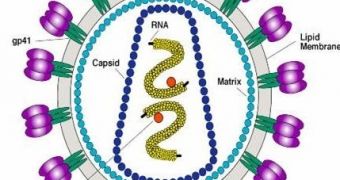HIV, the virus causing AIDS, impairs our immune system and it does it so well that till now, no cure has been found.
A new Hopkins research explains how the virus manages to spread itself inside the body, infecting new cells. The findings reveal how unwittingly the organism implies in auto-infecting itself, not leaving the job just for the virus, in the case of HIV and other retroviruses.
"It appears that cells make HIV and other retroviruses by a naturally occurring export mechanism," said Dr. Stephen Gould, Professor of Biological Chemistry at Johns Hopkins.
Cells normally expel membrane-bound molecules outside the cells through small sacs called exosomes. By investigating human T-cells under a microscope, the researchers found the requirements for a protein to employ the exosomal method of traveling.
"Surprisingly, all that's needed for a protein to get out of the cell in exosomes are the ability to clump together and attach to the cell's membrane," said Gould.
In one test, the team just clumped nearby proteins by adding chemicals to make them eligible and to be expelled from the cell by exosomes. When the researchers put a tether to force naturally-clumping proteins inside the cell to the membrane, the proteins were sent out by the exosomes.
The biggest HIV protein 'Gag' accomplishes both requirements for the exosomal transport. When the tethers or clumping signals from Gag were cut off, the virus was trapped in the cell. When replaced with synthetic membrane anchors and clumping domains Gag restored the virus's capacity of employing the exosomes.
"Cells may have initially developed exosomes as a quality control mechanism to get rid of clumped proteins, which are generally broken and useless." said Gould.
But retroviruses seem to have speculated this cell process and now rely on exosomes to infect new cells.
A drug impairing the activity of the exosome could stop the HIV infection.
"Viruses like HIV use pathways we barely recognize, much less understand. Our paper highlights the importance of studying their basic biochemistry and cell biology, which can yield a better understanding of normal human biology as well as identify new avenues in the fight against human disease." said Gould.

 14 DAY TRIAL //
14 DAY TRIAL //